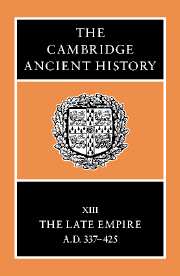Book contents
- Frontmatter
- PART I CHRONOLOGICAL OVERVIEW
- PART II GOVERNMENT AND INSTITUTIONS
- PART III THE EMPIRE: ECONOMY AND SOCIETY
- PART IV FOREIGN RELATIONS AND THE BARBARIAN WORLD
- 13 Warfare and diplomacy
- 14 The eastern frontier
- 15 The Germanic peoples
- 16 Goths and Huns, c. 320–425
- 17 The barbarian invasions and first settlements
- PART V Religion
- PART VI ART AND CULTURE
- BIBLIOGRAPHY
- Index
- Map 1: The Roman empire in the late fourth century a.d.
- Map 2: Gaul and the German frontier
- Map 3: The Balkans and the Danube region
- Map 6: Asia Minor and the eastern provinces
- References
13 - Warfare and diplomacy
from PART IV - FOREIGN RELATIONS AND THE BARBARIAN WORLD
Published online by Cambridge University Press: 28 March 2008
- Frontmatter
- PART I CHRONOLOGICAL OVERVIEW
- PART II GOVERNMENT AND INSTITUTIONS
- PART III THE EMPIRE: ECONOMY AND SOCIETY
- PART IV FOREIGN RELATIONS AND THE BARBARIAN WORLD
- 13 Warfare and diplomacy
- 14 The eastern frontier
- 15 The Germanic peoples
- 16 Goths and Huns, c. 320–425
- 17 The barbarian invasions and first settlements
- PART V Religion
- PART VI ART AND CULTURE
- BIBLIOGRAPHY
- Index
- Map 1: The Roman empire in the late fourth century a.d.
- Map 2: Gaul and the German frontier
- Map 3: The Balkans and the Danube region
- Map 6: Asia Minor and the eastern provinces
- References
Summary
WAR, DIPLOMACY AND THE ROMAN STATE
To the Romans, as to most people of antiquity, war was the primary means by which the state defined and maintained itself against outsiders. In the Roman historical tradition military prowess and success in war had guaranteed the survival and then the expansion of the state. From the foundation of the Roman polity to the end of the republic the possession of military skills, demonstrated by success in war, underwrote the preeminence of the aristocracy and the rise to prominence and authority of individuals within this élite. Augustus, in establishing a hereditary principate, cut the aristocracy at large off from the most powerful office then available and thus both consummated and altered the role of military success in the political process. But he in no way diminished the importance of war in Rome's relations with its neighbours. Rome of the principate, like Rome of the late republic, was a conquest state in which success in war retained its prestige. As a result, even though the emperor might contrive to rest his claim to his position on factors other than success in war – dynastic, or, later, theocratic – he was careful to retain at the very least the symbolic status of a great warrior through the insistence that all wars were fought under his auspices and through the appropriation as triumphal tides of the names of the peoples defeated by his generals.
In late antiquity this tradition remained alive. Alexander and Trajan were the paradigms against which emperors were judged, and it was no accident that the winged Victory was the last of the pagan personifications to survive on the Roman coinage well into the fifth century.
- Type
- Chapter
- Information
- The Cambridge Ancient History , pp. 411 - 436Publisher: Cambridge University PressPrint publication year: 1997

